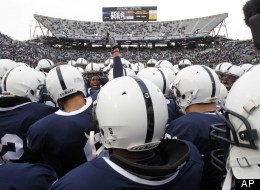


The Penn State football team gathers on the field after
warmups before an NCAA college football game against Michigan State at
Beaver Stadium in State College, Pa., Saturday, Nov. 27, 2010.
One day after the
statue of Joe Paterno was removed
from outside of Beaver Stadium on the Penn State campus, NCAA President
Mark Emmert announced sanctions resulting from the football program's
role in the sexual abuse scandal involving former defensive coach Jerry
Sandusky. On Sunday, the NCAA announced its intention to
implement "corrective and punitive measures" against Penn State.
On Monday, Emmert presided over a press conference in Indianapolis
and revealed sanctions, including a hefty fine, a postseason ban, and
loss of scholarships and previous wins.
"Football will never again be placed ahead of educating, nurturing and protecting young people,"
Emmert said during a press conference that lasted approximately 45 minutes.
Penn State Punishments:
"For the next several years PSU can focus on rebuilding its athletic
culture, not worrying about whether it's going to a bowl game,"
Emmert said as he explained the rationale for this set of sanctions.
Shortly after Emmert concluded his remarks, Penn State Dr. Rodney
Erickson issued a statement, addressing the NCAA punishment.
The tragedy of child sexual abuse that occurred at our
University altered the lives of innocent children. Today, as every day,
our thoughts and prayers continue to be with the victims of Mr. Sandusky
and all other victims of child abuse.
Against this backdrop, Penn State accepts the penalties and
corrective actions announced today by the NCAA. With today's
announcement and the action it requires of us, the University takes a
significant step forward.
The NCAA ruling holds the University accountable for the failure of
those in power to protect children and insists that all areas of the
University community are held to the same high standards of honesty and
integrity.
The announcement of these punishments comes less than two weeks after
former FBI director Louis Freeh released his 267-page scathing report
indicating that Joe Paterno and three top Penn State officials
"repeatedly concealed critical facts" about the child-sex abuse committed by Sandusky.
Although Emmert previously indicated that
the NCAA's "Death Penalty" was on the table
in this case, Penn State football will not be suspended. Speaking about
the NCAA's decision not to impose the Death Penalty, as it did to SMU
during the 1980s, Emmert said that the "
suspension of the football program would bring significant unintended harm."
Although Penn State will be permitted to play football during the
upcoming season and throughout the period of punishment, head coach Bill
O'Brien and his staff face an uncertain future. O'Brien also issued a
statement after the NCAA sanctions were revealed, reaffirming his
dedication to Penn State.
Today we receive a very harsh penalty from the NCAA and as
Head Coach of the Nittany Lions football program, I will do everything
in my power to not only comply, but help guide the University forward to
become a national leader in ethics, compliance and operational
excellence. I knew when I accepted the position that there would be
tough times ahead. But I am committed for the long term to Penn State
and our student athletes.
MORE FROM THE ASSOCIATED PRESS:
INDIANAPOLIS -- The NCAA slammed Penn State with an
unprecedented series of penalties Monday, including a $60 million fine
and the loss of all coach Joe Paterno's victories from 1998-2011, in the
wake of the Jerry Sandusky child sex abuse scandal.
Other sanctions include a four-year ban on bowl games, the loss of 20
scholarships per year over four years and five years' probation. The
NCAA also said that any current or incoming football players are free to
immediately transfer and compete at another school.
NCAA President Mark Emmert announced the staggering sanctions at a
news conference in Indianapolis. Though the NCAA stopped short of
imposing the "death penalty" - shutting down the Nittany Lions' program
completely - the punishment is still crippling for a team that is trying
to start over with a new coach and a new outlook.
Sandusky, a former Penn State defensive coordinator, was found guilty
in June of sexually abusing young boys, sometimes on campus. An
investigation commissioned by the school and released July 12 found that
Paterno, who died in January, and several other top officials at Penn
State stayed quiet for years about accusations against Sandusky.
Emmert fast-tracked penalties rather than go through the usual
circuitous series of investigations and hearings. The NCAA said the $60
million is equivalent to the annual gross revenue of the football
program. The money must be paid into an endowment for external programs
preventing child sexual abuse or assisting victims and may not be used
to fund such programs at Penn State.
"Football will never again be placed ahead of educating, nurturing and protecting young people," Emmert said.
Emmert had earlier said he had "never seen anything as egregious" as
the horrific crimes of Sandusky and the cover-up by Paterno and others
at the university, including former Penn State President Graham Spanier
and athletic director Tim Curley.
The investigation headed by former FBI Director Louis Freeh said that
Penn State officials kept what they knew from police and other
authorities for years, enabling the abuse to go on.
There had been calls across the nation for Penn State to receive the
"death penalty," and Emmert had not ruled out that possibility as late
as last week - though Penn State did not fit the criteria for it. That
punishment is for teams that commit a major violation while already
being sanctioned.
CORRECTION: An earlier version of this story stated that the $60 million fine levied against Penn State correlated to the
team's annual football profits rather than revenue.


